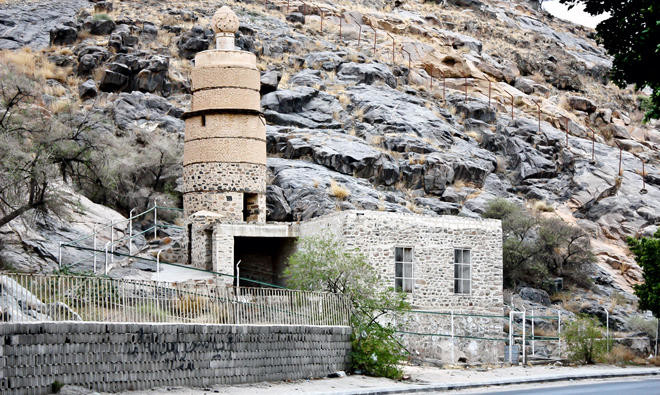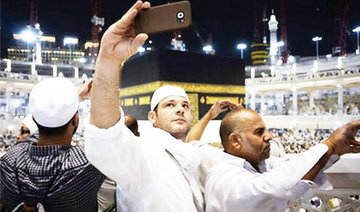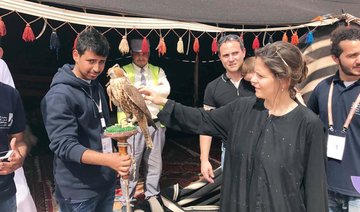TAIF: Flocks of Hajj and Umrah performers travel to Taif, 70km from Makkah, to visit the city’s historical places.
One of the main attractions in Taif is the Al-Qu’a and Al-Qantara Mosque, located in Al-Mathnah neighborhood.
Khalid Al-Shirbi, a licensed tour guide for the Saudi Commission for Tourism and National Heritage (SCTH), told Arab News that the Qantara Mosque, also known as Al-Madhoun Mosque, was built some 162 years ago. “It was built during the Ottoman era. It is only its building style, inspired from Abbasid architecture, that gives the impression of being ancient,” he said.
He added that the farm where Prophet Muhammad rested after being expelled from Taif and was offered fruit by Addas, the grape farmer, is on the opposite side of the mosque.
Another mosque that many tourists are keen to visit in Taif is the Al-Qu’a Mosque, which Al-Shirbi confirmed was built some 800 years after the death of the Prophet.
“Many tourists believe that Prophet Muhammad came to this place and, with his elbow, leaned on a stone, leaving a mark,” Al-Shirbi said. He added that tour guides normally try to clear up such incorrect concepts, but some stories, he said, are engraved in tourists’ minds.
He pointed out that most of the visiting tourists come from Malaysia, Indonesia, Pakistan, Singapore, Bangladesh and Turkey.
“The Pakistanis, in particular, call it ‘Hazrat Ali Mosque,’ referring to Al-Bin Abi Talib, the Prophet’s cousin, who they think was with the Prophet when he was in Taif. “This is completely untrue. Islamic biographers have different opinions whether the Prophet was alone or accompanied by Zaid bin Haritha, but not Ali.”
Many scholars and historians have narrated the story of Prophet with Addas in different ways, but they all agreed on one theme. Sheikh Mohammed Al-Areefy, for instance, said: “After his wife, Khadija bint Khwuailed, and his uncle, Abu Talib, had passed away in the same year, which was later called “Year of Sadness,” he sought a place where he could find supporters. When he arrived in Taif, his call to Islam was not only robustly rejected, he was also followed on his way back to Makkah, and had stones thrown at him until he reached Al-Mathnah Valley, where he rested for a while.
“This area was known for its fruits. A Christian Iraqi farmer, Addas, who was serving a rich family originating from Makkah, approached the sad Prophet and offered him a bowl of grapes.
“The Prophet took the grapes and before starting to eat the fruit, said: ‘In the name of Allah.’ The phrase, which the worker had not heard before, sparked his attention and he asked: People here do not say that! The Prophet asked Addas where he was from. “From Nineveh,” the man replied. The story ended with the man embracing Islam.
Taif mosque is a historic Saudi jewel with a story to tell
Taif mosque is a historic Saudi jewel with a story to tell

Saudi defense minister holds talks with UK security, defense officials

- Prince Khalid bin Salman and UK National Security Advisor Jonathan Powell discussed strategic partnership between the two countries
LONDON: Saudi Arabia’s Defense Minister Prince Khalid bin Salman held talks with the UK’s National Security Advisor Jonathan Powell in London on Wednesday.
The two sides “reviewed the strong friendship and strategic partnership between Saudi Arabia and the UK,” the Saudi Press Agency reported. “They also reviewed areas of cooperation and discussed regional and global developments, as well as ongoing efforts to support security and stability.”
The talks followed a meeting on Tuesday between Prince Khalid and British Defense Secretary John Healey during which they discussed strategic defense cooperation.
Saudi Embassy coordinating with Turkiye to find boy who fell into a creek

- The embassy coordinated with child’s family after he reportedly went missing in a river in Trabzon province
- Turkish authorities are investigating the incident
ANKARA: The Saudi Arabian Embassy in Turkiye confirmed on Wednesday that it is coordinating with Turkish authorities to search for a Saudi child who reportedly fell into Haldizen Creek in Uzungol region.
According to the Saudi Press Agency, the embassy issued a statement clarifying the reports circulating in media outlets and across social media platforms regarding the incident in Trabzon province.
“From the first moments of the incident, the embassy coordinated with the child’s family and contacted the relevant Turkish authorities to investigate the incident,” the statement said.
“The authorities have responded and are gratefully conducting extensive searches in the area and its surrounding to locate the child. We ask God Almighty to crown these efforts with success and to protect everyone from all harm,” it added.
Founding nations sign Global Water Organization charter in Riyadh

- Ceremony was attended by Saudi FM Prince Faisal bin Farhan, who highlighted the importance of the GWO in tackling water issues worldwide
- Prince Faisal said that Saudi Arabia would provide financial and logistical support to the GWO for the next five years
RIYADH: The Global Water Organization officially launched operations from its headquarters in Riyadh on Wednesday, with founding member states signing the organization’s charter.
The ceremony was attended by Saudi Foreign Minister Prince Faisal bin Farhan, who highlighted the importance of the GWO in tackling water issues worldwide through a holistic approach, the Saudi Press Agency reported.
“The launch of the Global Water Organization affirms Saudi Arabia’s commitment to strengthening international initiatives and addressing global challenges through partnerships based on cooperation between countries and governments,” Prince Faisal said.
“The Kingdom looks forward to the organization becoming an international platform that drives sustainable solutions and supports developing nations in enhancing their water capabilities,” he said.
Prince Faisal said that Saudi Arabia would provide financial and logistical support to the GWO for the next five years, emphasizing that collective action was essential to achieving shared objectives. Prince Faisal invited all countries and private-sector entities to join the organization.
Minister of Environment, Water and Agriculture Abdulrahman Al-Fadley took part in the ceremony and emphasized that the signing of the Global Water Organization’s charter and the launch of its operations from Riyadh reinforced shared international responsibility to preserve water resources.
Al-Fadley added that the importance of the organization stemmed from water being not just a resource, but a source of economic and social development and stability worldwide.
He described the organization as “not just a platform that brings countries together, but a collective global mind working to develop and integrate the efforts of countries and organizations to address water challenges comprehensively.”
“The Global Water Organization will lead international efforts to address water-related challenges and transform traditional water management approaches. These challenges go beyond water scarcity to ensure its availability at the right time and place and recognize its impact on the economy, public health, food security and supply chains, especially in the face of climate change,” he said.
He emphasized the importance of having an integrated system that covered all stages of the water cycle, adopting innovative economic models based on cost-benefit analysis, introducing new financing mechanisms, reducing reliance on government subsidies, and actively involving the private sector.
The GWO’s charter was signed by representatives from founding countries: Saudi Arabia, Kuwait, Qatar, Spain, Senegal, Pakistan, Greece and Mauritania.
The organization aims to strengthen the efforts of countries and organizations to address water challenges.
Saudi FM receives US envoy to Syria in Riyadh

Saudi Arabia’s Foreign Minister Prince Faisal bin Farhan received US envoy to the Syrian Arab Republic Thomas Barrack in Riyadh on Wednesday.
During the meeting, they discussed steps to provide economic, humanitarian and other support to the Syrian people, the Saudi Foreign Ministry said in a post on X.
Meanwhile, Saudi Arabia’s Deputy Minister of Foreign Affairs Waleed Elkhereiji received Ambassador of Italy to the Kingdom Carlo Balducci in Riyadh on Wednesday.
They discussed bilateral relations and other topics of common interest.
The smart pilgrim’s suitcase: What Saudis are packing for Hajj

- Tech gadgets find their way to the holy cities alongside traditional garments
- Modern pilgrims pack for comfort as well as reverence and spiritual intent
RIYADH: As Hajj season approaches, pilgrims throughout Saudi Arabia are making lists, checking supplies, and organizing their thoughts for what many consider the most significant journey of their lives.
Alongside the spiritual preparations, pilgrims are packing Hajj suitcases with the traditional white garments and hygiene essentials as well as more personalized, thoughtful and even high-tech items.
From prayer lists and handwritten dua cards to smartwatches, earbuds, and journal notebooks, the modern pilgrim approaches Hajj not only with reverence but with intent, structure, and a little comfort.
For many, this approach reflects how deeply Hajj is embedded into the personal identity and emotional world of the pilgrim.
Arab News spoke with a few people who have previously completed Hajj to get an idea of what it is like to prepare for the pilgrimage.
“I packed my journal because I felt this experience deserved to be documented in detail,” Shatha Al-Jadaan, 25, told Arab News. “I also included my daily skincare products, easy-access snacks, and drip coffee sachets — lifesaver,” she added.
The contents of Al-Jadaan’s suitcase told the story of a young woman approaching Hajj with equal parts practicality and reflection.
Her essentials included headphones, a smartwatch and a hair dryer — items she considered necessary after each of the physically demanding rituals.
For her, the process of preparation brought a deep sense of meaning.
“What struck me the most was the realization that this journey is unlike any other,” she said. “The version of me leaving home is not the same one returning.
“That thought hit me hardest when I was writing prayer lists for loved ones. People sent very specific prayers, personal hopes and goals. I even made a separate list so I wouldn’t forget anyone, including myself.”
Some pilgrims take a simpler approach. For Ethar Abdulrahman, 22, the focus was on utility and peace of mind.
“My essentials were a toothbrush, toothpaste, shampoo, conditioner, body lotion, deodorant, underclothes, outerwear, hair ties and wet wipes,” she said. “And I only brought my personal phone — just to stay in touch with my family.”
What made her preparation emotional was the fact that it was her first Hajj — and at a young age.
“The idea that I was going on Hajj for the first time and at such a young age was emotional on its own. Packing my personal items and bringing prayer books made it even more special.”
She also relied heavily on advice from seasoned pilgrims: “Bring Panadol, fever reducers, painkillers, and muscle relief cream. That advice helped me a lot.”
Her words reflect the layered purpose of each item: some for health, some for spiritual focus, and some simply for emotional safety.
Al-Jadaan echoed the sentiment. “A lot of people told me to only wear cotton and make sure my shoes were extremely comfortable. And it was the best advice I received.”
The overlap between generational wisdom and modern convenience shows how today’s pilgrims are combining tradition with adaptation.
For Mariam Al-Osaimi, 27, essential oils were a must. “I brought lavender and peppermint oil. Lavender helped me sleep, and peppermint was great for energy. They became part of my daily Hajj routine — almost like a spiritual ritual.”
Others took folding prayer mats, lightweight Qur’an readers, and portable chargers — recognizing the role technology can play in navigating crowds, locating tents, or staying connected to family.
One of the more discreet but powerful changes to the modern Hajj experience is the seamless integration of digital tools. Most pilgrims now use digital Qur’an apps, prayer reminder apps, or even step counters to track their movement during the rites.
Abdulrahman Al-Ruwaili, 29, said his smartwatch was more than just a gadget. “I set reminders for prayer times, prayers for each ritual, and even tracked my heart rate on the way to Jamarat,” he said.
“It helped me stay focused, grounded, and aware of how my body was responding, in case of potential panic attack due to my medical condition.”
While some may frown at these modern additions, many people see them as useful companions in the demanding spiritual and physical journey.






















